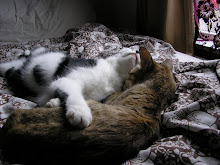Well, Christmas is over - sort of - and the sales frenzy is busily creating a
dead cat bounce in the UK economy.
Harold Pinter is RIP. And the original Three Legged Cat has had a rather dramatic festive period, as a result of which he's now a three-legged, one-fanged cat.
And in Gaza, the Israeli airforce is reported on the
BBC this morning to have killed 40 people and injured dozens more in bombing raids overnight. Accordingly, below is the full text of an email from an excellent Gazan reporter which I received last Friday, covering not the attacks but the general ongoing effects of the Israeli blockade.
For More Media Reportings and News Reports contact me on:
Mob: 00972599306096
Sameh.habeeb@gmail.com
Hunger before the storm
By: Sameh Akram HabeebIsraeli politicians, in the run-up to elections, are promising to deal a severe blow to Gaza as this is how Israeli policy is made. However, every household in Gaza is already under siege. In Gaza you can only find pale, angry and frustrated faces. If you visit my house you won't find power, while my neighbor is out of gas. Another neighbor seeks potable water as power outages have left him without for four days. A third neighbor desparately looks for milk for his child but does so in vain. Another friend who lives on the corner needs medicine that can't currently be found in Gaza.
There is no shortage of such stories in Gaza (though there is a shortage of nearly everything else). Perhaps broadcasting such stories would result in pressure on Israeli leaders to stop the siege. Because what is happening is that the entire Gaza population of 1.5 million -- densely packed into a small area -- is being punished for crude rockets being fired into Israel by a few.
Shaher Mazen, 25, holds a degree in political science but works as a taxi driver to put bread on the table for his family. I spoke to him while I was on my way to some of the Gaza bakeries to cover some news that was happening there. Shaher was frustrated because of siege and furious towards the two rival Palestinian governments, considering them as weak in the face of Israel.
Mazen said, "We are under an organized Israeli media campaign. We are being starved and victimized by Israel. The world think we are besieging Israel, not the other way around. Israel is playing up the issue of rocket fire to besiege us more and more."
Al-Shanty bakery in Gaza City is one of the Strip's largest, supplying tens of thousands with bread. Yesterday, hundreds of people crowded outside the bakery in a very long queue, waiting for a bag of bread. Children, women and men were awaiting the chance to buy some bread, which has become scarce as Israel has not allowed the import of adequate supplies of flour and cooking gas.
"Our bakery is out of bread for days now and what we have will only last for another 24 hours. In fact, we stopped our work yesterday as we ran out of flour. Now, we use animal feed which will finish in a matter of hours," explained 24-year-old Abed Masod while he busily worked at the bakery.
A woman's voice arose above the crowd. She started to scream and appealed to God for salvation and relief from Gaza's dire situation. Forty-five-year-old Om Ali Shoman's weary face bore the impact of Gaza's suffering. "This is our destiny," she said. "It's a conspiracy designed against us. What did my children do to stay at home with no bread? Did they fire rockets? Did they kill Israelis? Are they holding guns?"
Only about a dozen of Gaza's 47 bakeries are currently operating as of yesterday, but with rapidly diminishing supplies. The UN agency for Palestine refugees (UNRWA) had to stop its food aid deliveries because Israel has not allowed it to replenish its stores. This affects 750,000 refugees in the Gaza Strip.
Gazans fear that the worst, however, is yet to come as the Israeli government renews its threats of a major offense against the Gaza Strip, irrespective of the civilian toll an invasion would inevitably incur.
Time is running out in Gaza and mass starvation looms as Gaza's skies are further darkened with threats of an Israeli military incursion. As a journalist, peace activist, and one of the hundreds of thousands of Gazans who are being collectively punished by Israel, I urge those who read this to appeal their governments to hold Israel accountable to international law, including the Fourth Geneva Convention, article 33 of which forbids the collective punishment of a civilian population. Though it unilaterally removed its illegal settlement population from the Gaza Strip in 2005, Israel has remained in control of Gaza's borders, sea and airspace, as well as its population registry, and remains the occupying power, and as such is obligated to abide by international humanitarian law, including the Fourth Geneva Convention.
I urge readers to press their governments to force Israel to respect the countless United Nations resolutions that affirm Palestinian rights, and which Palestinian leaders demand must be immediately implemented.
Please don't let Gaza's plight be forgotten, and urge those around you to act as well.
All photos in the link below by Sameh A. Habeeb:
http://picasaweb.google.com/sameh.habeeb/BakeriesOfGazaOutOfBreadPeopleAreHungry#
Sameh A. Habeeb is a photojournalist, humanitarian and peace activist based in the Gaza Strip, Palestine. He writes for several news websites on a freelance basis.
Contact me:
Sameh A. Habeeb, B.A.
Photojournalist & Peace Activist
Humanitarian, Child Relief Worker
Gaza Strip, Palestine
Mob: 00972599306096
Tel: 0097282802825
E-mail: Sam_hab@hotmail.com
Sameh.habeeb@gmail.com
Skype: Gazatoday, Facebook: Sameh A. habeeb
Web:
www.gazatoday.blogspot.comDaily Photos:
http://picasaweb.google.com/sameh.habeeb













